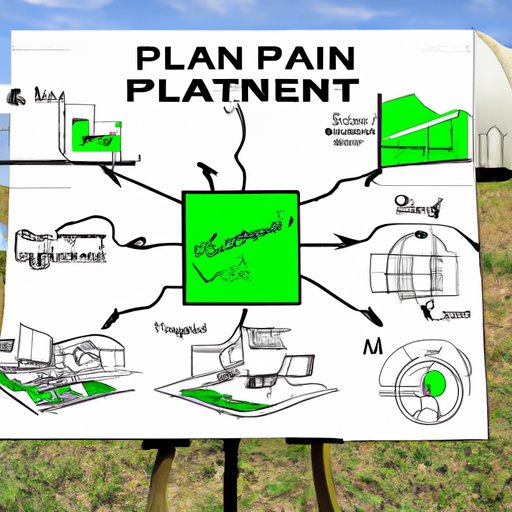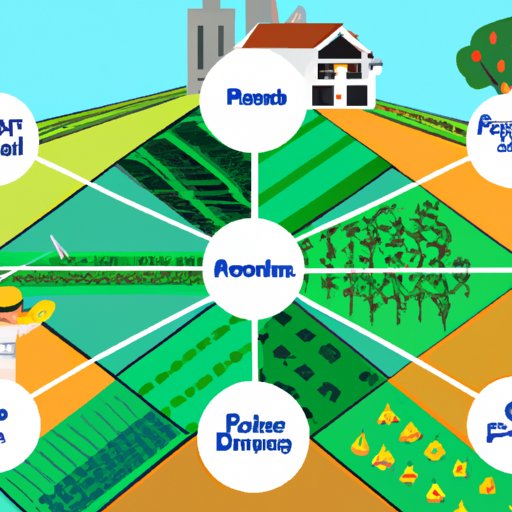Introduction
Starting a farm business is an exciting venture that can be both financially rewarding and personally fulfilling. Before launching your farm business, it’s important to understand the basics of running a farm, research regulations and industry practices, develop a business plan and establish a legal structure, acquire financial resources, choose a location, and obtain necessary licenses and permits. With the right preparation and strategy, you can create a successful and sustainable farm business.
What is a Farm Business?
A farm business is an organization that produces agricultural products such as fruits, vegetables, grains, dairy products, eggs, livestock, and poultry. Farm businesses range in size from small family farms to large commercial operations. The type of farm business you choose will depend on your goals and resources.
Why Start a Farm Business?
There are many reasons why people decide to start a farm business. For some, it’s a way to pursue their passion for agriculture and provide healthy food to their local community. For others, it’s an opportunity to generate a steady income and build a successful business. Whatever your motivation, starting a farm business can be a rewarding experience.
Research the Basics of Starting a Farm Business
Before launching your farm business, it’s important to research the basics of starting a farm business. This includes gathering information on regulations and industry practices, understanding your target market, and considering your resources.
Gather Information on Regulations and Industry Practices
It’s important to understand the regulations and industry practices that apply to your farm business. Research local, state, and federal laws that may affect your farming operations, including zoning laws, labor laws, and environmental regulations. Additionally, learn about industry-specific practices such as organic certification, animal welfare standards, and food safety protocols.
Understand Your Target Market
Knowing your target market is essential for running a successful farm business. Identify who your customers are and what they need. Research the competition in your area and determine how you can differentiate your farm business. Consider how you will reach your target market and how you will price your products.
Consider Your Resources
Take stock of the resources available to you when starting your farm business. Assess your land, equipment, labor, capital, and other resources. Determine which resources you will need to acquire and develop a plan for doing so.

Develop a Business Plan for Your Farm
Creating a business plan is an important step for any farm business. A business plan outlines your goals, estimates costs, and develops a budget and marketing plan. It also serves as a roadmap for the future of your business.
Outline Your Goals
Start by outlining your long-term and short-term goals for your farm business. Consider your desired level of growth, timeline, and resources needed to achieve your goals. These goals should be realistic and achievable.
Estimate Costs
Next, estimate the costs associated with launching and operating your farm business. Include costs for labor, equipment, supplies, licensing fees, insurance, and more. Make sure to factor in unexpected costs such as repairs and emergencies.
Prepare a Budget
Using your estimated costs, develop a budget for your farm business. Break down expenses into categories such as operational costs, capital costs, and marketing costs. Track your income and expenses over time to ensure your business remains profitable.
Create a Marketing Plan
Develop a marketing plan for your farm business. Identify your target market and the strategies you will use to reach them. Consider creating a website and utilizing social media to promote your business. Additionally, explore potential partnerships with other businesses or organizations.

Establish a Legal Structure for Your Farm
The legal structure of your farm business will determine your liability and tax obligations. When deciding on a legal structure, consider the size and scope of your business, the number of owners, and your personal goals.
Decide Which Type of Entity to Form
The most common types of entities for farm businesses are sole proprietorships, partnerships, limited liability companies (LLCs), and corporations. Each of these has advantages and disadvantages, so it’s important to research each option before making a decision.
Understand Local, State, and Federal Regulations
In addition to choosing a legal structure, it’s important to understand the regulations that apply to your farm business. Research local, state, and federal laws related to taxes, employment, and safety. Additionally, seek advice from an attorney or accountant to ensure you are compliant with all applicable laws.
Seek Professional Advice
Consulting with a professional such as an attorney or accountant can help you make informed decisions when establishing the legal structure of your farm business. An experienced professional can help you understand the legal requirements of your business and provide guidance on how to best protect your assets.
Acquire Financial Resources for Your Farm
Once you have established the legal structure of your farm business, it’s time to acquire financial resources. Explore funding sources, calculate your capital needs, and secure financing.
Explore Funding Sources
Research potential funding sources for your farm business. Consider grants, loans, and private investors. Additionally, look into government programs that may be able to provide assistance.
Calculate Your Capital Needs
Determine how much capital you need to launch and operate your farm business. Estimate the cost of labor, equipment, supplies, insurance, and other expenses. Make sure to factor in emergency funds and working capital.
Secure Financing
Once you know how much capital you need, it’s time to secure financing. Apply for loans, grants, and other forms of financing that may be available to you. Work with a financial advisor to ensure you get the best terms for your loan.

Choose the Right Location for Your Farm
Choosing the right location for your farm business is essential for success. Evaluate land options, consider accessibility, and analyze local climate.
Evaluate Land Options
When selecting a location for your farm, evaluate land options in your area. Consider factors such as soil quality, topography, drainage, and access to water. Additionally, research zoning laws and other regulations that may affect your farming operations.
Consider Accessibility
Think about how accessible your farm business will be to customers, suppliers, and other stakeholders. Consider proximity to transportation, population centers, and other businesses. Additionally, explore options for shipping and delivery.
Analyze Local Climate
It’s important to understand the local climate when selecting a location for your farm. Research average temperatures, rainfall, and other weather conditions in your area. Consider how climate may affect your farming operations and determine if there are any measures you can take to mitigate risks.

Obtain Necessary Licenses and Permits
In order to legally operate your farm business, you must obtain the necessary licenses and permits. Determine relevant regulations, secure required permits, and consider insurance coverage.
Determine Relevant Regulations
Research the regulations that apply to your farm business. Understand local, state, and federal laws and industry-specific standards. Contact your local government office for more information.
Secure Required Permits
Once you understand the regulations that apply to your farm business, you can begin the process of securing the required permits. Depending on your location and type of operation, you may need permits for things such as land use, water use, and air emissions.
Consider Insurance Coverage
Insurance is an important consideration for any farm business. Consider the risks associated with your operations and the coverage you need to protect your business. Speak with an insurance agent to discuss your options.
Market Your Farm Business to Customers
Marketing is essential for any farm business. Develop a brand, create an online presence, utilize social media, and identify potential customers.
Develop a Brand
Creating a recognizable brand is essential for any business. Develop a logo, slogan, and other elements that define your farm business. Utilize these elements in your marketing materials and promotional activities.
Create an Online Presence
Having an online presence is important for any business. Create a website for your farm business and consider setting up accounts on social media platforms. Additionally, explore options for selling your products online.
Utilize Social Media
Social media is a powerful tool for reaching your target market. Use social media to engage with customers, promote your products, and build relationships. Additionally, utilize social media advertising to reach a wider audience.
Identify Potential Customers
Know who your potential customers are and where to find them. Research local markets, restaurants, and other businesses that may be interested in your products. Additionally, consider participating in farmers markets and other events to meet potential customers.
Conclusion
Starting a farm business can be a rewarding and profitable endeavor. To ensure success, it’s important to research the basics of starting a farm business, create a business plan, establish a legal structure, acquire financial resources, choose a location, and obtain necessary licenses and permits. Additionally, market your farm business to customers to ensure your products reach the right people. With the right preparation and strategy, you can create a successful and sustainable farm business.
(Note: Is this article not meeting your expectations? Do you have knowledge or insights to share? Unlock new opportunities and expand your reach by joining our authors team. Click Registration to join us and share your expertise with our readers.)
